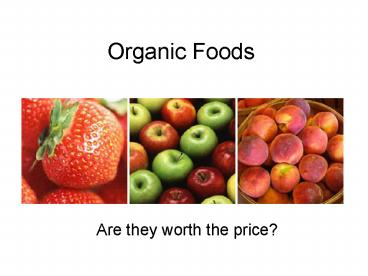Organic Foods - PowerPoint PPT Presentation
1 / 12
Title:
Organic Foods
Description:
Is there a nutritional difference between. organically and conventionally grown foods? ... Most organic food costs more than conventional food products. ... – PowerPoint PPT presentation
Number of Views:281
Avg rating:3.0/5.0
Title: Organic Foods
1
Organic Foods
- Are they worth the price?
2
What are Organic Foods?
- Food raised without chemicals and produced
without additives. - The United States Department of Agriculture
(USDA) now has national standards for use of the
word organic.
3
Conventional Farming vs. Organic Farming
4
Guide to Organic Food Terms
- 100 organic - single ingredient such as a
fruit, vegetable, meat, milk and cheese (excludes
water and salt). - Organic - multiple ingredient foods which are
95 to 100 organic. - Made with organic ingredients - 70 of the
ingredients are organic. Can appear on the front
of package, naming the specific ingredients. - Contains organic ingredients - contains less
than 70 organic ingredients.
5
Understanding Labels
- What Does the Label on Your Chicken Really
Mean? - "100 Natural" Chicken According to the U.S.
Department of Agriculture (USDA) - "100 percent
natural" means the poultry doesn't contain
artificial ingredients like preservatives. But
experts warnthere are no guarantees."100
percent naturalrememberno inspections are done.
So we don't know if those claims are really
true," says Shannon Wallace, R.D., registered
dietitian with Baylor University Medical Center
at Dallas. - Organic Chicken Chicken labeled as "organic"
must meet much stricter standards. Inspections
are conducted and organic chicken cannot contain
artificial ingredients, hormones or antibiotics.
But are those really harmful to consumers?"The
USDA does not make any claims that organically
produced food is any safer or more nutritious
than conventionally produced food," adds
Wallace. - Grain fed Chicken This is supposed to mean the
chicken was not fed animal by-products, but just
like "100 percent natural" and "free range,"
there is no outside monitoring for this claim. - Free Range Chicken And probably the most
confusing label of them all - "free range."
Chicken labeled as "free range is supposed to be
leaner, but again, experts warn the claim can be
deceiving."Free range does not always mean that
the animal has been in an open area its whole
life. It may only mean they were in a restricted
area and let out into that open area one time
during their life," says Wallace
6
Nutrition
- Is there a nutritional difference between
- organically and conventionally grown foods?
- Research shows that nutritionally there is no
- evidence that organic produce is better or
- safer than conventionally grown produce.
- The only difference is in the way they are
- grown and processed.
- American Dietetics Association
7
Quality and Appearance
- Organic foods must meet the same quality and
safety standards as conventional foods. How Food
is produced, processed and handled is the main
difference in organic and conventional food. You
may find that organic fruits and vegetables spoil
faster because they aren't treated with waxes or
preservatives. Organic produce may also have a
blemished appearance odd shapes, varying colors
and perhaps smaller sizes. In most cases,
however, organic foods look just like
conventional.
8
Pesticides Environment
- Conventional growers use pesticides to protect
their crops from molds, insects and diseases.
When farmers spray pesticides, this can leave
residue on produce. Some people buy organic food
to limit their exposure to these residues. Most
experts agree, however, that the amount of
pesticides found on fruits and vegetables poses a
very small health risk. - Some people buy organic food for environmental
reasons. Organic farming practices are designed
to benefit the environment by reducing pollution
and conserving water and soil.
9
Cost
- Most organic food costs more than conventional
food products. Higher prices are due to more
expensive farming practices, tighter government
regulations and lower crop yields. Because
organic farmers don't use herbicides or
pesticides, many management tools that control
weeds and pests are labor intensive.
Organic Consumers Association LA Stores
10
Taste
- Some people say they can taste the difference
between organic and non-organic food. Others say
they find no difference. Taste is a subjective
and personal consideration, so decide for
yourself. But whether you buy organic or not,
finding the freshest foods available may have the
biggest impact on taste.
11
Buying Tips
- Buy fruits and vegetables in season to ensure the
highest quality. - Read food labels carefully..
- Don't confuse natural foods with organic foods.
- Wash all fresh fruits and vegetables thoroughly
with running water to reduce the amount of dirt
and bacteria. - If you're concerned about pesticides, peel your
fruits and vegetables and trim outer leaves of
leafy vegetables in addition to washing them
thoroughly.
12
References
- USDA www.usda.gov
- American Dietetic Association www.eatright.org
- Mayo Clinic www.mayoclinic.com
- North Carolina Cooperative Extension
www.ces.ncsu.edu - Organic Consumers Association www.organicconsumers
.org - www.healthcastle.com
- www.hormonefreefoods.com































